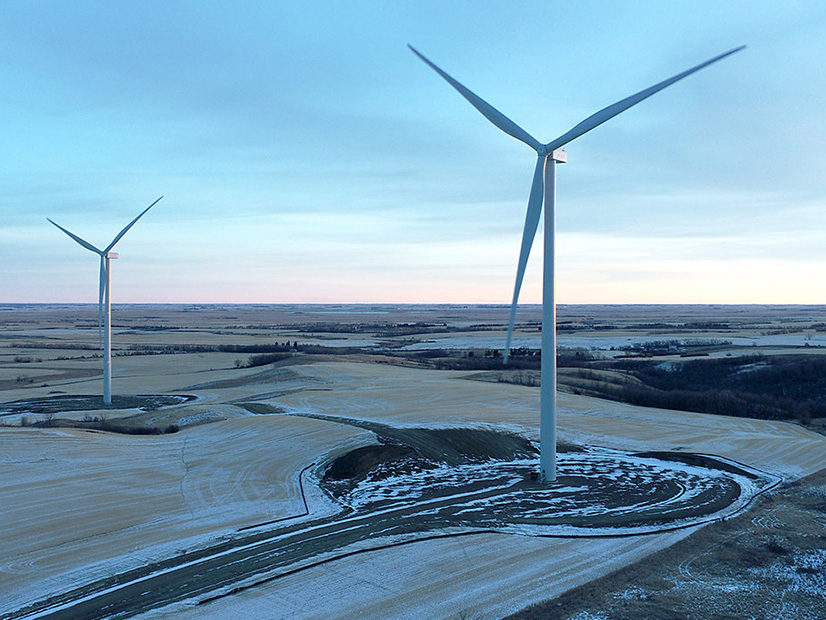FERC last week accepted three unexecuted network upgrade agreements for wind farms in the Dakotas and Minnesota, filed by MISO interconnection customers in protest over the commission’s order reinstating transmission owners’ rights to self-fund the upgrades.
MISO restored TOs’ rights to self-fund in 2019 at FERC’s direction. The commission originally issued an order in 2015 preventing TOs from providing initial funding for network upgrades, but that decision was remanded by the D.C. Circuit Court of Appeals.
The court ruled in November that FERC did not adequately explain why it reinstated TOs’ option to finance network upgrades before the interconnection customers owning generation projects were given the chance. (See FERC Must Clarify MISO Tx Funding Decision, DC Circuit Finds.)
The financing change has been generally unpopular with some MISO generation developers. They say it could lay the foundation for TOs to discriminate against some interconnection customers and increase the cost of new generation. (See MISO TOs’ Self-funding Option Tested Again.)
FERC accepted two unexecuted facilities service agreements (FSAs) between the Oliver Wind IV and Northern Divide Wind facilities, transmission owner Otter Tail Power and MISO (ER23-998, ER23-999). It also accepted an unexecuted multiparty facilities construction agreement between the same four parties and Palmer’s Creek Wind Farm, Prairie Hills Wind, Campbell County Wind Farm 2, North Bend Wind Project and Union Electric Company (ER23-997).
The Oliver Wind IV and Northern Divide Wind farms said they refused to execute their FSAs to reserve the right to terminate them and be made financially whole should FERC revert to its initial findings on TO self-funding.
Oliver Wind IV also asked FERC to order an amendment to the agreement that states the changes “will be undone if the legal premise for [transmission owner initial funding] is later eliminated.”
Otter Tail disagreed with the request. “Unless and until the commission not only acts upon remand, but also reverses its prior position, the unexecuted FSA continues to reflect the state of the law today and should be accepted for filing,” it said.
FERC agreed with Otter Tail. The commission said it will not allow MISO interconnection customers to “retroactively annul and reverse” TO funding elections if it later decides to reverse the self-funding order.
The agreements “appropriately reflect the state of the law as of the date the agreements become effective,” FERC said. It said its response to the court’s remand remains pending, and it will address any request to annul funding elections “if and when” a Section 205 or 206 filing is made under the Federal Power Act.
“Neither a request for rehearing nor a petition for review stays the effectiveness or enforceability of a commission order,” the commission said.
MISO has been revising legacy interconnection agreements for TOs who wanted the self-funding option. (See FERC Accepts Documents in MISO TOs’ Self-fund Selection.)
Commissioner Mark Christie wrote identical concurrences to the orders to underscore his philosophy on who should pay for and profit from network upgrades. He said generation developers should bear the full “but-for” costs of their interconnection.
“Consumers (i.e., load) should not pay one nickel. They are not the ones seeking to profit from the interconnection,” Christie wrote. “New generation in RTOs is supposed to be driven by the market, not by integrated resource planning, as in non-RTOs. This is the compelling principle underlying participant funding of interconnection in RTOs.”
MISO interconnection customers are responsible for 100% of network upgrade costs, with a possible 10% reimbursement from load for network upgrades that are rated 345 kV and above.
Christie said that when generation developers pay the full interconnection costs, TOs should not be allowed to profit from the investment, “as the developer incurs a cost of capital, not the transmission owner.”
“Allowing the transmission owner to profit on someone else’s capital investment (i.e., through a return on equity) results in an unearned windfall,” Christie said. He added that he looked forward to addressing his points in the remand proceeding.




